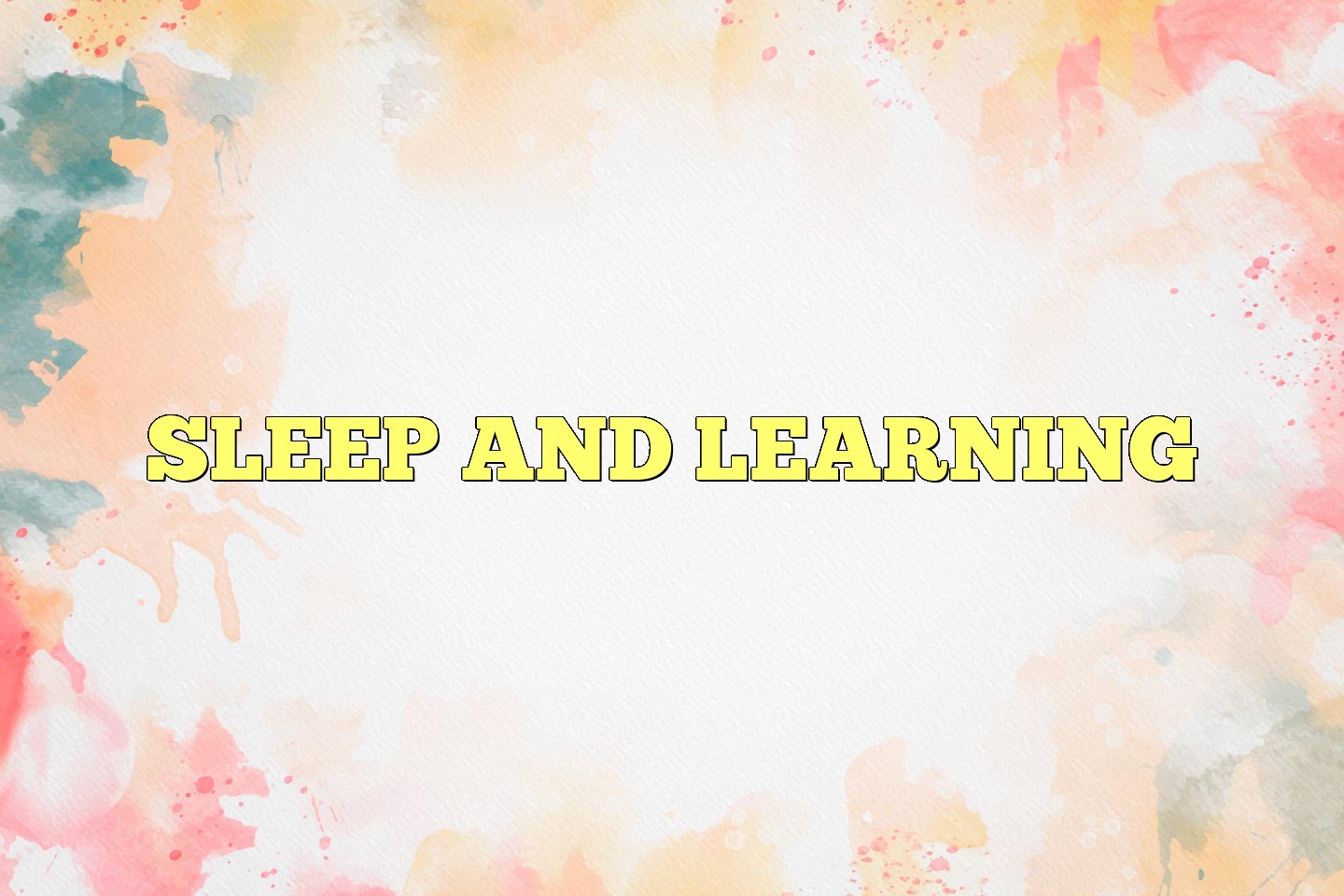Sleep and learning are two essential components of our daily lives, yet their relationship is often overlooked. While we all know that a good night’s sleep is important for our overall health and well-being, many people are unaware of the significant impact sleep has on the process of learning. In recent years, researchers have delved deeper into this relationship and have uncovered fascinating findings on how sleep plays a crucial role in consolidating and strengthening our memories, ultimately enhancing our ability to learn. In this essay, we will explore the intricate connection between sleep and learning and discuss the various ways in which sleep affects our cognitive processes. By the end, we hope to shed light on the importance of quality sleep for optimal learning and academic success.

Many competing theories have been advanced to discover the possible connections between sleep and learning in humans. One theory is that sleep consolidates and optimizes the layout of memories, though recent evidence suggests this may be restricted to implicit procedural memories.
Increased learning
Popular sayings can reflect the notion that remolded memories produce new creative associations in the morning, and that performance often improves after a time-interval that includes sleep. Many studies demonstrate that a healthy sleep produces a significant learning-dependent performance boost. Healthy sleep must include the appropriate sequence and proportion of NREM and REM phases, which play different roles in the memory consolidation-optimization process. In motor skill learning, an interval of sleep may be critical for the expression of performance gains; without sleep these gains will be delayed (Korman et al., 2003). However, several studies show that, in some conditions, time after training, even without sleep, may suffice for attaining significant performance boosts (Roth Ari-Even et al., 2005).
In a study, procedural memories have been shown to benefit from sleep (Walker et al., 2002, as cited in Walker, 2009). Subjects were tested using a tapping task, where they used their fingers to tap a specific sequence of numbers on a keyboard, and their performances were measured by accuracy and speed. This finger-tapping task was used to simulate learning a motor skill. The first group was tested, retested 12 hours later while awake, and finally tested another 12 hours later with sleep in between. The other group was tested, retested 12 hours later with sleep in between, and then retested 12 hours later while awake. The results showed that in both groups, there was only a slight improvement after a 12 hour wake session, but a significant increase in performance after each group slept. This study gives evidence that sleep is a significant factor in consolidating motor skill procedural memories.
Declarative memory has also been shown to benefit from sleep, but not in the same way as procedural memory. A study was conducted where the subjects learned word pairs, and the results showed that sleep not only prevents the decay of memory, but also actively fixates declarative memories (Ellenbogen et al., 2006, as cited in Walker, 2009). Two of the groups learned word pairs, then either slept or stayed awake, and were tested again. The other two groups did the same thing, except they also learned interference pairs right before being retested to try and disrupt the previously learned word pairs. The results showed that sleep was of some help in retaining the word pair associations, while against the interference pair, sleep helped significantly. A study has also found that after sleep there is an increased insight, that is, a sudden gain of explicit knowledge. Thus during sleep the representation of new memories are restructured. A 2010 study has found that taking an afternoon nap increases learning capacity.
Electrophysiological evidence in rats
A 2009 study based on electrophysiological recordings of large ensembles of isolated cells in the prefrontal cortex of rats revealed that cell assemblies that formed upon learning were more preferentially active during subsequent sleep episodes. More specifically, those replay events were more prominent during slow wave sleep and were concomittant with hippocampal reactivation events. This study has shown that neuronal patterns in large brain networks are tagged during learning so that they are replayed, and supposedly consolidated, during subsequent sleep.
Sleep in relation to school
Sleep has been directly linked to the grades of students. One in four U.S. high school students admit to falling asleep in class at least once a week. Consequently, results have shown that those who sleep less do poorly. In the United States sleep deprivation is common with students because almost all schools begin early in the morning and many of these students either choose to stay awake late into the night or cannot do otherwise due to delayed sleep phase syndrome. As a result, students that should be getting between 8.5 and 9.25 hours of sleep are getting only 7 hours. Perhaps because of this sleep deprivation, their grades lower and their concentration is impaired. As a result of studies showing the effects of sleep deprivation on grades, and the different sleep patterns for teenagers, a school in New Zealand, changed its start time to 10:30 a.m., in 2006, to allow students to keep to a schedule that allowed more sleep. In 2009, Monkseaton High School, in North Tyneside, had 800 pupils aged 13–19 starting lessons at 10 a.m. instead of the normal 9 a.m. and has reported that general absence has dropped by 8% and persistent absenteeism by 27%. Similarly, a high school in Copenhagen has committed to providing at least one class per year for students who will start at 10 a.m. or later.
Other theories
Other researchers’ theories on additional functions of sleep differ significantly. One older idea is the energy conservation theory. Others claim that REM sleep is needed to “refresh” the brain after the NREM phase, or that REM is needed to prevent stasis of fluids in the eye (Roth Ari-Even et al., 2005).